Eight trends from election denialists to watch in the US midterm elections
4 October 2022
By Sabine Lawrence, Lucy Cooper, Isabel Jones, Ciaran O’Connor and Jared Holt
Analysts at the Institute for Strategic Dialogue (ISD) identified eight trends during the 2022 US primary elections that are likely to persist or escalate during general elections this fall.
This Dispatch has been covered in an op-ed for the Daily Beast.
There are key differences between the information and political landscape prior to the 2020 elections, and the landscape today. For one, online audiences of election-denialist content have blossomed to sustain a lucrative media circuit that traffics almost exclusively in conspiracy theories and misinformation about elections in the United States.
Dominant hyper-partisan media outlets and Republican Party leaders have shown themselves to be tolerant, if not outright encouraging, of their supporters’ most conspiratorial tendencies on this front. Many Republican Party political candidates have also surrendered to or bought into the election-denying constituencies within their voter base; FiveThirtyEight reported that 60 percent of American voters will have a 2020-election-denying candidate on their ballots this fall.
A similar dynamic is present with respect to extremist organizing. Following increased scrutiny after the January 6 Capitol riot, many movements fractured and de-organized on a national scale. Despite this, the sentiments driving such movements maintain outsized power over the national-level Republican political discourse and activism spaces.
In some senses, the environment today is more treacherous to the integrity of US elections than it was before 2020 elections. What it lacks, however, is a clear, singular, and national voice delivering calls-to-action. Lacking a united central plan, trends have expressed themselves in myriad ways across locales. One can witness the effects at LGBTQ-friendly events where extremist groups have openly protested, at local government bodies where officials have been threatened, and in election offices buried in information requests from conspiracy theorists’ followers.
Foreign state actors with experience deploying influence operations targeted at American voters also continue to pose risks. This was evidenced by Meta’s recent takedown of foreign networks of fake accounts pushing such content. Activity observed in 2016 and 2020 makes clear that both the Kremlin and Chinese Communist Party have the technical infrastructure and expertise needed to deploy large-scale information operations during the 2022 midterm elections. Whether they will choose to expend those efforts and resources remains to be seen, and it is unlikely to be clear until the dust settles from the elections. For now, their networks of news outlets and social media assets are simply amplifying misleading stories, disinformation-based claims, and divisive extreme rhetoric—all of which are being produced and circulated by domestic actors in the US information space at larger scales.
Several major tech platforms have issued election-specific policies ahead of the midterms, promising to restrict political ads, label misinformation and slow its spread, and offer users reliable sources of information about voting. Many companies banned waves of election-denialists after the 2021 Capitol riot but have been largely inactive against the ranks of likeminded influencers who stepped into those vacancies, leading some influencers to accumulate millions of followers. Other online personalities who were caught in the wave of de-platforming last year have rebuilt followings on alternative platforms. Ultimately, this means that the online election-related misinformation landscape has expanded significantly since 2020.
ISD analysts have monitored election-denialist and extremist online communities since the beginning of this year. We have focused on both national spaces and five states where races are polling closely, and where high levels of political organizing occurred after the 2020 election: Arizona, Georgia, Michigan, Pennsylvania, and Wisconsin.
What follows is a list of eight trends our analysts observed during 2022 primary elections in those states and beyond. ISD is sharing its findings in the hope of promoting evidence-based understandings of the current landscape and informing appropriate responses to safeguard the integrity of democracy in the US.
1. Violent and Heated Rhetoric Targeting Election Workers and Public Officials
ISD analysts observed upticks in the use of violent and threatening language directed at election workers and officials during primary elections in key states. Users in online communities that promote election-denialism often deployed this rhetoric in a reactive sense: tensions were routinely inflamed by accusations from influencers and junk news outlets catering to those audiences, and who themselves often rehashed accusations from the 2020 cycle.
Using Brandwatch, a social media analytics tool, analysts found that keywords associated with threats and aggressive language obtained comparatively moderate levels of reach online, peaking around primary election dates—specifically on August 3 and 10 (following primaries in Michigan, Arizona, and Wisconsin, respectively). ISD assesses that such language inherently produces high levels of risk for targets, regardless of audience size. Harassment and threats, which can lead to substantial harms of various kinds, can happen on a multitude of scales, including via networked individuals or lone actors.
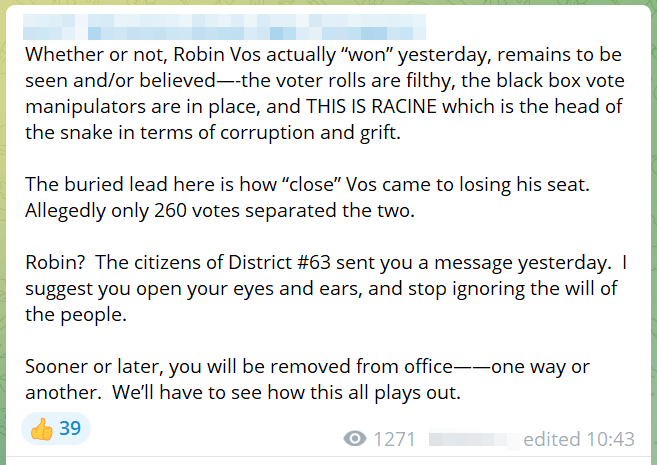
Figure 1. Threatening message about primary candidate Robin Vos
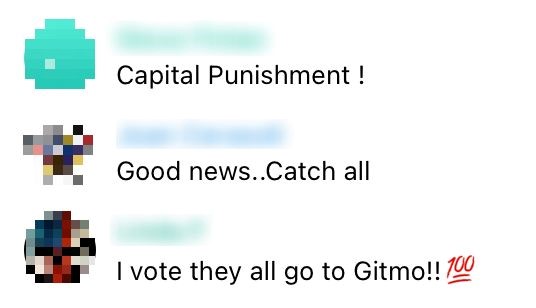
Figure 2. Threatening rhetoric about those involved in elections

Figure 3. Insinuations of the necessity of violence against those involved in elections
2. Calls for Vigilante Actions at Drop-Boxes and Polling Locations
Frustrated with a perceived lack of major action against the people and entities they believe enabled or encouraged the supposed corruption of the 2020 election, some election-deniers have encouraged each other to take matters into their own hands. Analysts observed influencers and organized supporter groups calling for civilian surveillance of ballot drop-boxes; the sabotage of election infrastructure like electronic voting machines; and the removal of materials like tabulator tape from polling locations.
In the last month, ahead of general elections, these calls for action have increased in volume and intensity, introducing logistical elements and clearer calls-for-action into conversation. Both partisan groups engaged in election-related activism and organized right-wing extremist groups have encouraged followers to step in where they believe law enforcement and other government agencies have failed to do so. Analysts also witnessed calls for the destruction of ballot drop-boxes. Related calls for action spiked ahead of primary elections in Michigan, Arizona, and Wisconsin: August 1 and 9, specifically.
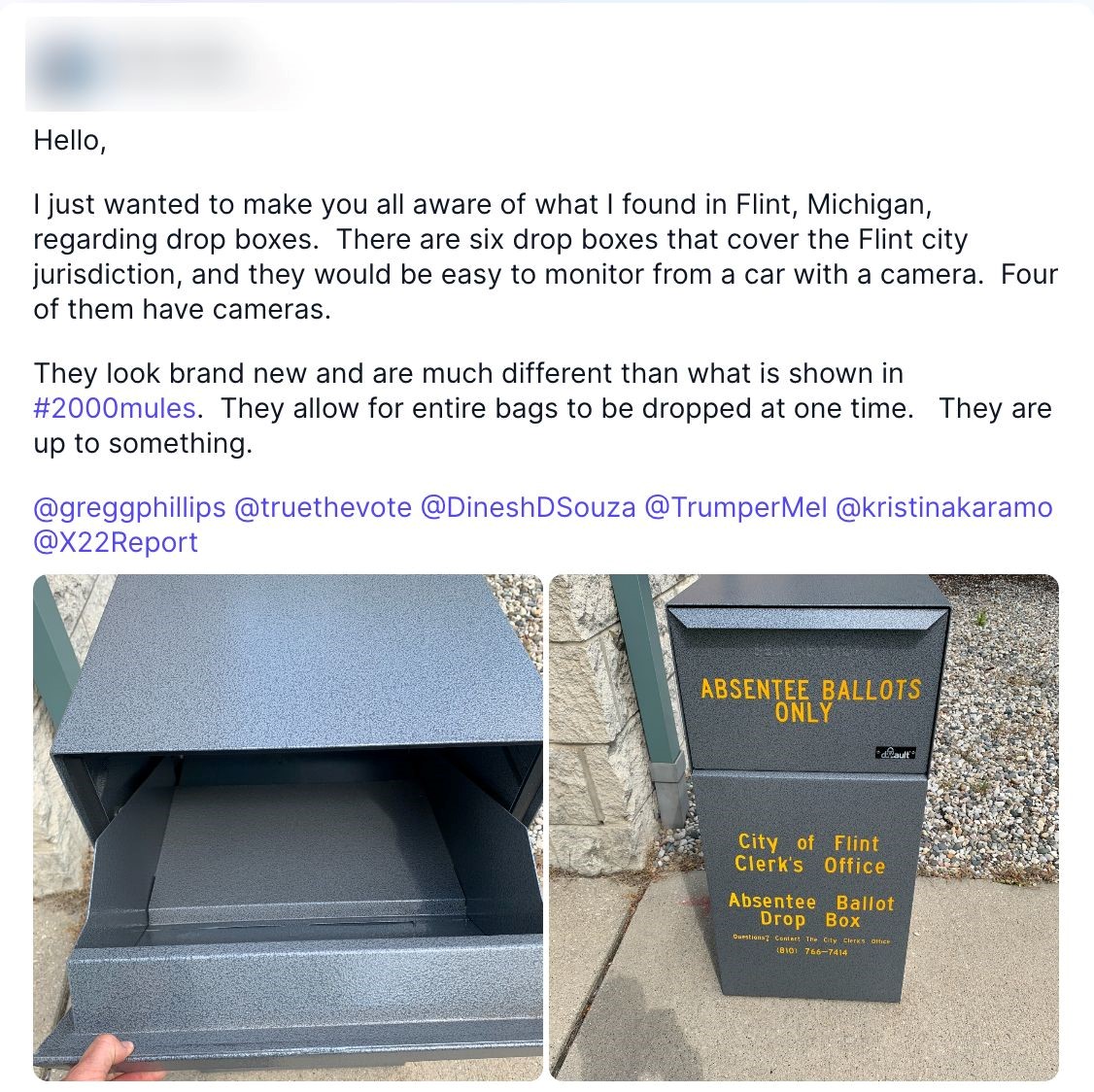
Figure 4. A conspiratorial claim about drop box tampering
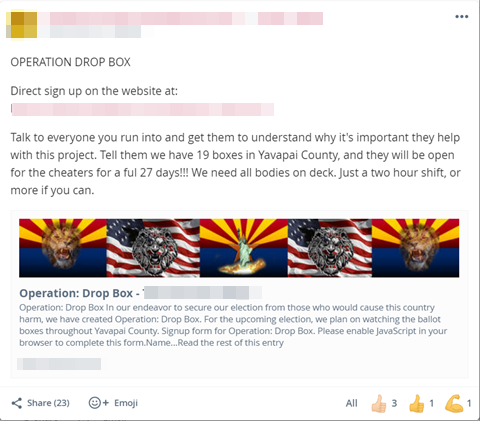
Figure 5. Conspiratorial claims about drop boxes
3. Small-Scale Organizing and Information Crowdsourcing
Election-deniers and far-right influencers have increasingly encouraged organizing at the local and state level. These efforts have included encouraging supporters to volunteer as election workers, solicit information from local officials, and circulate petitions to modify voting procedures.
Analysts noted the emergence of databases and tools such as mobile apps to log information, to which influencers encouraged followers to contribute. These, in turn, populate further databases that influencers and groups can cite for their efforts. This trend carries potential to produce sudden and unpredictable risks, stemming from the lack of accountability and control present in these technologies. Strategic buy-in from major stakeholders in the election-denialist space and pressures for followers to contribute material produce risks of voter intimidation and the inflammation of false narratives about voting well past 2022 Election Day.
4. Delays and Irregular Reporting Cited as Proof of Wrongdoing
During primary elections, analysts observed election-denying influencers and outlets directing attention to delays and irregularities in election results, claiming them as evidence to support their ongoing claims about voter fraud.
While prior trends noted in this list primarily appeared in online communities dedicated to denying the outcome of the 2020 election, analysts observed these narratives permeating into larger, more-moderate Republican audiences.
A keyword analysis with Brandwatch found that messages related to alleged delays and irregularities were among the most widely shared in observed communities among the trends noted in this list. As many locales continue efforts to enable easy voting outside of polling locations, through mail-in voting, ballot drop boxes, and mobile voting units, ISD expects these narratives to be similarly prevalent in general elections this fall.
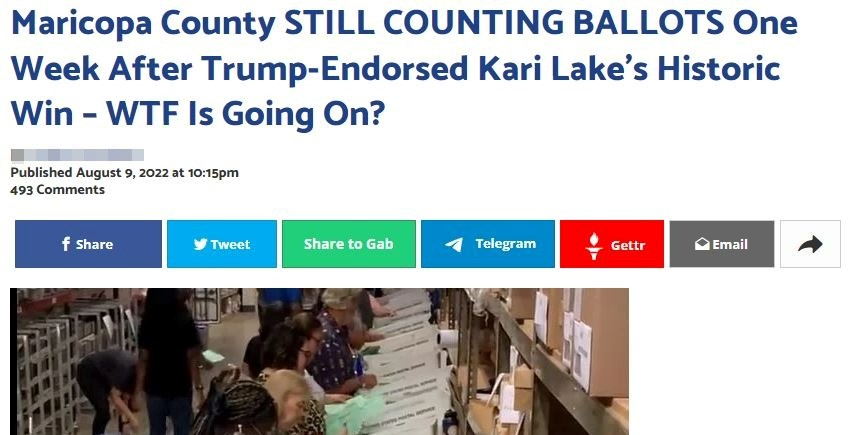
Figure 6. A conspiratorial headline about Maricopa County’s ballot counting procedure
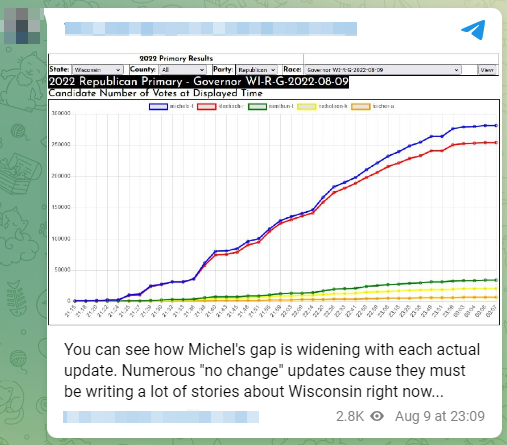
Figure 7. Conspiratorial claim about the Wisconsin Republican primary
5. Calls for Audits, Hand-Recounts, and Decertification
Almost immediately after polls closed during primary elections, analysts observed election-denialist communities and influencers demanding vote counts be audited, ballots be hand-counted, and results be decertified. The prevalence and immediacy of these calls serves as a strong indication that the same will occur before, during, and especially after the general election this fall.
Observed instances of these demands surrounding primary elections in observed election-denialist communities came paired with misinformation about voting and elicited aggressive rhetoric from election-denialist online communities. In discussions related to this trend, analysts identified allegations surrounding delays and voting irregularities as the most prevalent type of election-related narrative included in this list regarding its adoption among highly influential Republicans like former President Donald Trump, who exerted pressure during the Wisconsin primaries against a favored Republican gubernatorial candidate who would not decertify the state’s 2020 election results.
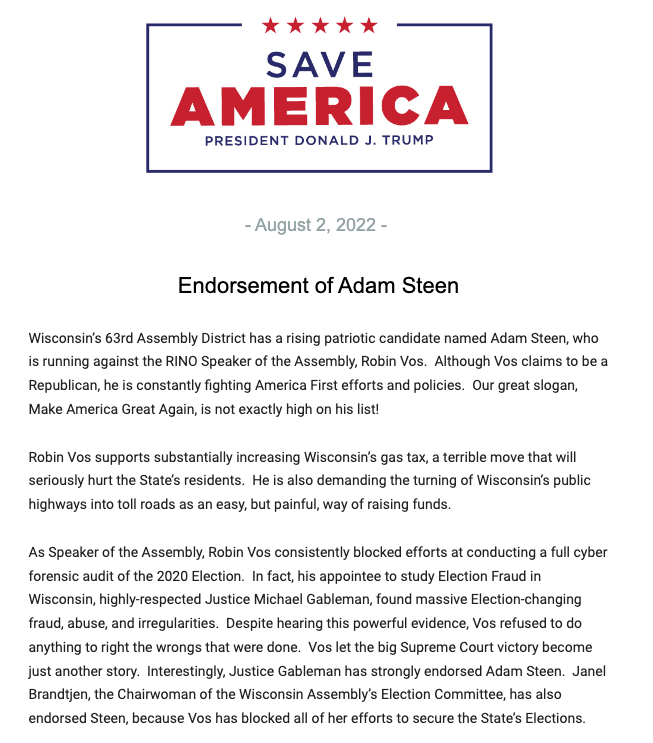
Figure 8. Donald Trump endorses Adam Steen in the Wisconsin primary
6. Efforts to Undermine Trust in Elections Infrastructure
Alleged issues at polling locations during primary elections were leveraged by election-denialist influencers and groups to advance claims of election fraud centered on the machines and processes used to count ballots.
During primary elections, and ahead of November’s midterm elections, prominent voices in Republican-aligned election activism spaces have made allegations related to this trend. These include claims that: polling locations have distributed pens which are unreadable to electronic voting machines; some election infrastructure companies are compromised by the Chinese government; and GOP-aligned poll challengers have faced discrimination. These narratives produce risks to voters, poll workers, and employees of companies that produce election infrastructure.
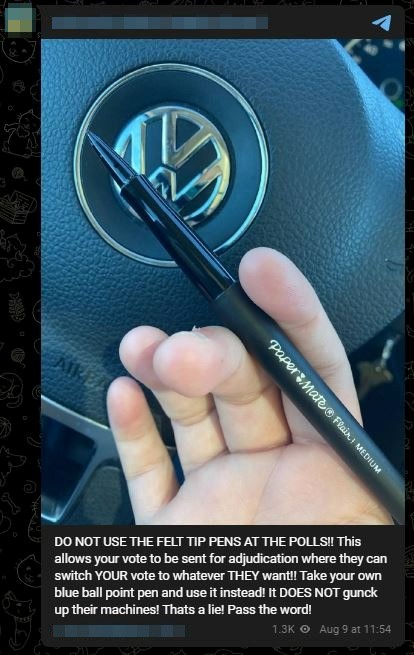
Figure 9. A conspiratorial claim about the use of pens at polling stations
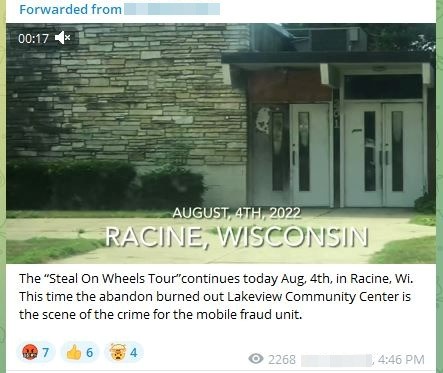
Figure 10. An electoral fraud claim targeting the Wisconsin primary

Figure 11. A conspiratorial headline asking whether “Chinese Spies” are influencing US elections
7. Voter Suppression Narratives and Tactics
Advocacy groups and influencers that cater to election-denialists have sown doubt around efforts to expand voting access, including early and mail-in voting.
Influencers have disparaged automated systems that send mail-in ballots to registered and eligible voters, absentee ballot request systems, and other means of giving more voters opportunities to vote. Some influential voices have encouraged voters to cast ballots in-person and as late in the day as possible, claiming that doing so makes it harder for votes to be manipulated. These narratives have inspired activist groups to make demands of election officials to alter voting processes and oppose increased access to voting.
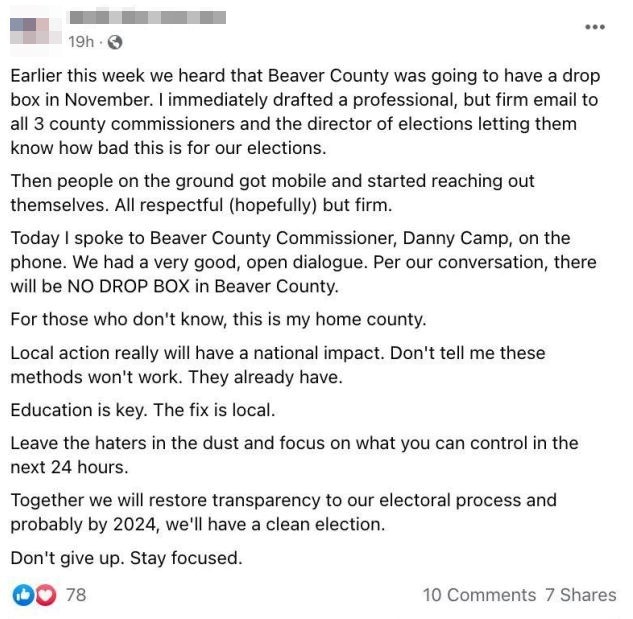
Figure 12. An attempt to reduce voter drop box access in Beaver County
8. Local to National and Back Again
National right-wing, far-right, and election-denying figures and media outlets repeatedly amplified claims made by state-level actors regarding alleged election fraud during primary elections, elevating these claims into national discourse. Higher-level influencers and politicians have consistently inserted themselves into local elections, particularly in close-contest races or in areas with particularly active supporters. Local claims also often spread via amplification from pundits in other smaller communities, creating a national network effect in fringe and mainstream online spaces. The relationship is understood as symbiotic: Just as national voices can shape local narratives, what happens locally can also influence national conversations.



